Improve — Inspire — Deliver
Leading by example
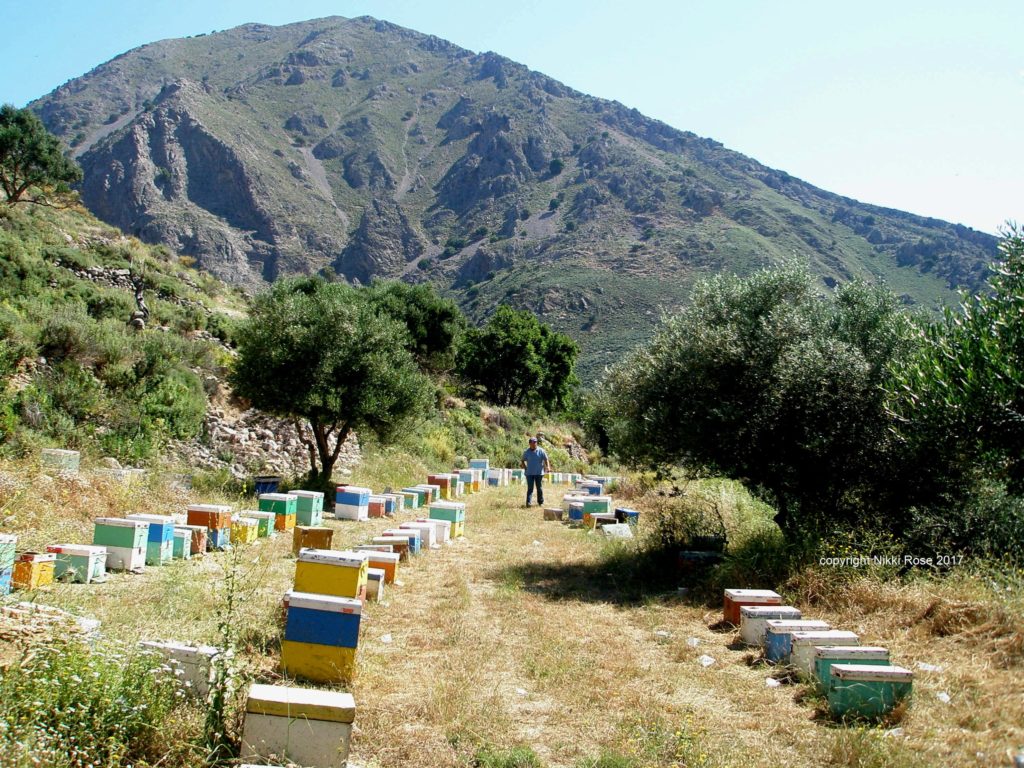
Crete’s Culinary Sanctuaries Educational Network
Interactive educational programs focusing on culture, nature, organic agriculture and traditional cuisine
WHAT:
Crete's Culinary Sanctuaries (CCS) Educational Network in Greece is an award-winning “school without walls,” established in 1997 by Nikki Rose, a Greek-American journalist, seminar director, and pro chef. It helps provide tangible support to individuals working on action programs to share and protect their cultural-natural heritage. CCS is an all-local network of archaeologists, ecologists, organic farmers, heirloom seed savers, chefs and beekeepers that organizes accredited experiential learning programs to share culture, nature, organic agriculture, and cuisine. Over 3,000 students, teachers and journalists have attended the network’s programmes already. CCS has received awards from National Geographic, the United Nations Convention on Biological Diversity (CBD) as well as the World Travel and Tourism Council (WTTC) and is now working on a documentary highlighting Heritage Protectors in Crete.WHERE:
Heraklion, GreeceWHO & HOW:
The isle of Crete, Greece is blessed with a fascinating history spanning over 4,000 years of amazing natural beauty, and healthy food. There is much to discover – and there is much to protect. Crete's cultural and natural resources are rapidly diminishing due to unsustainable agriculture and development. Many village-communities have been abandoned and their knowledge of sustainable living practices, organic farming and self-sufficiency is lost. These are not just local problems; they are witnessed around the world.Through its vast range of programmes, the network aims at raising awareness of these issues, stimulating exchange of ideas, and creating local initiatives to support organic farming and other sustainable livelihoods.
The upcoming documentary “Heritage Protectors” is a continuation of CCS’ work to share crucial information with the global audience. The film covers history, biodiversity, toxicology, agroecology, young organic farmers, resilience, and hope. 22 people share their knowledge, initiatives, and dreams for a more resilient and sustainable society. Several people are globally renowned for their work, while others should be. CCS will also create an online platform with updates of heritage protectors in Crete and around the world.
MORE INFO
Have a look at the documentary’s trailer on the initiative’s website. Find the initiative on Facebook, LinkedIn and YouTube.
Email: nikkirose@cookingincrete.com
Photo credit: Nikki Rose
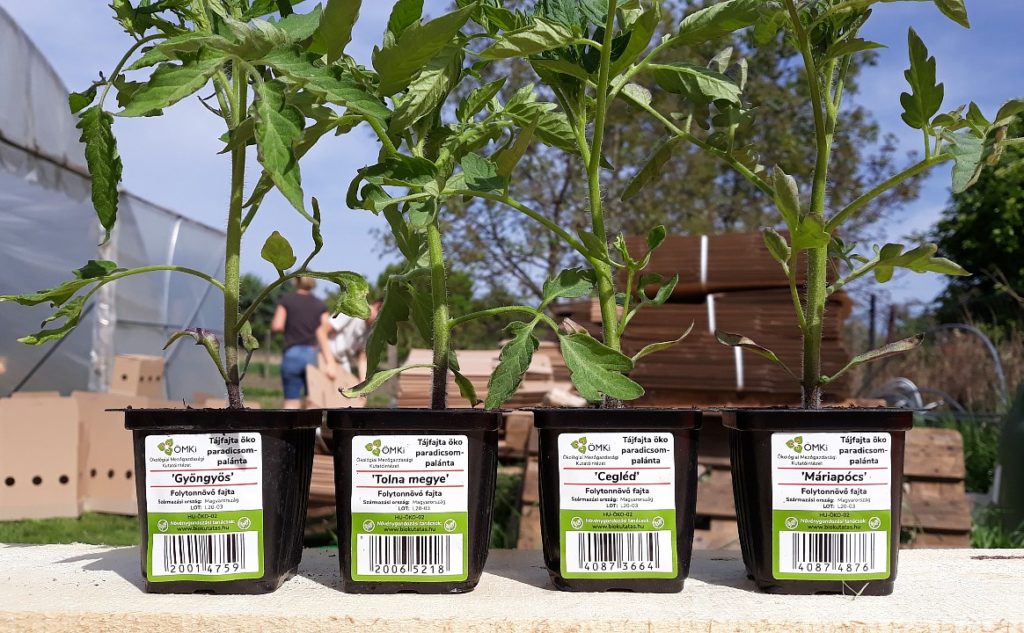
Enriching the genetic diversity of plants
Hungarian Research Institute of Organic Agriculture brings landrace varieties back into people’s gardens and on their plates
WHAT:
In 2012, the Hungarian Research Institute of Organic Agriculture (ÖMKi) launched a participatory research project on the usability of Hungarian tomato landraces on organic farms. The aim of this project was to reintroduce landraces that were most suitable for organic production and hence, enrich genetic biodiversity of plants farmed in Hungary and preserve the country’s valuable agricultural heritage. As a result, ÖMKi successfully re-established landrace tomatoes in agricultural production in the form of ‘Landrace Tomato Seedlings’. Quickly, the tomatoes in diverse colours, shapes and flavours became part of the everyday diet of Hungarians.WHERE:
HungaryWHO & HOW:
Due to industrialized agriculture, which mainly uses modern breeds and hybrids, all tomato landraces had disappeared from public production in Hungary by 2012. To obtain the necessary seeds for their research, ÖMKi turned to the Centre for Plant Diversity, a gene bank located in Tápiószele. The first years of the research were dedicated to studying 35 tomato landraces on 28 cooperating organic farms across the country. From 2015 onwards, 10 tomato landraces were chosen to be studied in detail for three production years in cooperation with the Szent István University.The landraces that proved to be the best in terms of production result, taste and composition were presented to the world during a seedling adoption event in 2018. Thanks to the great interest and success, a national store chain helped to bring the landraces back to organic gardens. Over the past two years, more than 16,000 seedlings have been sold. To keep up with the growing demand, about 20,000 seedlings will be supplied in spring 2021 and can be picked up from various collection points.
Landraces can substantially contribute to agrobiodiversity, facilitate local (climate) adaptation strategies, promote better livelihoods for farmers and improve resilience through genetic diversity and an enriched everyday diet. For all these reasons, landraces should be reintroduced into our food and farming systems rather than being preserved in gene banks as heritage cultivars.
MORE INFO
Find the initiative on ÖMKi website, Facebook, Twitter and YouTube.
Jade Ducretot, ÖMKi
Email: jade.ducretot@biokutatas.hu
Photo Credit: ÖMKi
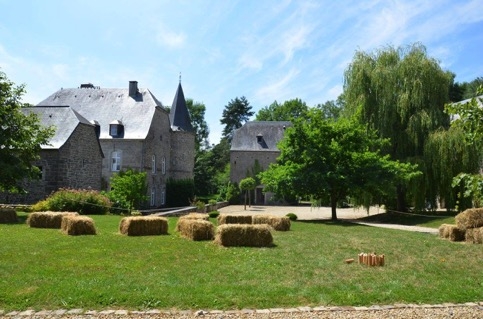
Froidefontaine
Farm incubator in the countryside of Belgium
WHAT:
On its 45 hectares, the farm Froidefontaine brings together food-makers and other ecological rural entrepreneurs to build a unique place for food, craft and education. It aims at uniting people with the goal to live in harmony with nature and inspiring people to contribute to more sustainable food production and consumption.WHERE:
Wallonia, BelgiumWHO & HOW:
The farm Froidefontaine provides the tools for producers, transformers and other people passionate about the development of a farm full of life: access to land, infrastructure, finance, accountancy, administrative support, as well as marketing. Currently, the farm hosts a variety of sustainable producers, ranging from cider to potatoes, vegetables, chickens, honey and natural colours extracted from flowers. For visitors, the farm offers a range of high-quality organic products, educational activities and boarding facilities. Froidefontaine applies regenerative and agroecological practices, protects natural zones and preserves biodiversity. Those who are active in the region and interested in the being part of the farm with their own project can apply to become part of the Froidefontaine farm.MORE INFO
Ferme de Froidefontaine, Facebook, Youtube, LinkedIn, Instagram
Email: info@froidefontaine.be
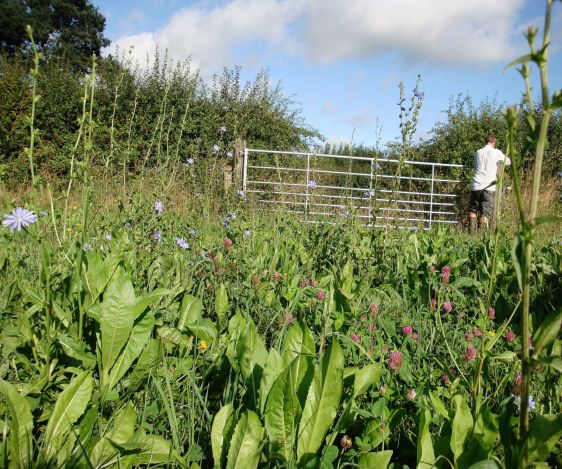
Pharmacy-Pasture
Healing soils, ecosystems and ruminants
WHAT:
Industrial farming contributes to the degradation of soils, the depletion of ecosystems and the misuse of antibiotics. The Pharmacy-Pasture project turns this trend around and offers livestock farmers the opportunity to sustainably fertilise their soils, restore ecosystems and ensure healthy ruminants.WHERE:
Brittany, FranceWHO & HOW:
Intensive farming has a long-standing tradition. However, more and more customers demand food that is produced sustainably.In 2015, Eilyps, an organisation that is closely working with farmers and comprising an organic department, has started providing their cows with the most diverse pasture environment possible. Since then, more than 50 hectares of pharmacy-pasture has been sown, containing herbs that contribute to the cows’ health within the framework of the Pharmacy-Pasture project. The project encourages the planting of trees, shrubs, wildflowers and herbs in hedges, making pasture land a true reservoir of health for livestock, while providing ecosystem services and restoring degraded soils.
So far, farmers are very happy about the results. Besides improved soil fertility, farmers reported on a more diverse and therefore secure forage stock, richer ecosystems and improved animal production efficiency. The integration of ecosystem-friendly livestock production, restoration of degraded soils and regard for animal welfare make the project a unique example of how economic and environmental benefits can be combined and multiplied.
MORE INFO
Pauline Woehrle, EILYPS
Email: pauline.woehrle@eilyps.fr, Tel: +33 6 88 84 29 11

Bringing Transparency to the Organic Food Industry
An integrated approach to increasing organic integrity
WHAT:
The vision of Organic Services is to create a more transparent organic sector, that brings producers, traders and consumers together through an integrative approach to supply chain management. Increasing the integrity of organic products by preventing fraud is at the heart of Organic Services initiative “Bringing Transparency to the Organic Food Industry: An Integrative Approach to Increasing Organic Integrity”. The initiative provides integrity management solutions to organic food companies, organic certifiers and organic farmers, including smallholder groups producing organic food.WHERE:
Asia, Europe, Latin AmericaWHO & HOW:
Increased sustainability and fairness must consider the supply chain of organic products. Long supply chains that do not connect all stakeholders pose the risk of fraud. A better connection and establishing relationships between producers, traders and consumers will increase transparency and foster integrity of the sector.This initiative proposes a new and integrative approach to supply chain management for a more transparent organic marketplace. Organic Services provides three IT-based integrity management solutions, which are tested and can be applied in different settings by single chain actors or the entire sector.
First, the implementation of the generic software Check X in the Italian organic grain and olive oil market shows that the establishment of a mass balance system from the farm throughout the supply chain is both very effective at preventing fraud and relatively simple. Second, the Ecert Basic tool allows certification bodies in Asia, South America and Europe to effectively and efficiently manage credible organic certification. The tool is based on the multi-modular audit management software Ecert® of Intact GmbH (Austria) and is the globally applied leading solution to prevent fraud. Last, Group Integrity is a tool targeted at smallholder farmer groups and companies with contract production. It is currently applied in various contexts all over the world and helps to include small actors in the organic marketplace, allowing them to become proactive in preventing fraud rather than just reacting towards the requirements of regulatory bodies.
In combination, the above-mentioned tools can secure the quality of organic certification and enhance the transparency and integrity of the organic value chain from farm to fork. They do so by connecting all organic stakeholders and offering them the opportunity to shape the organic marketplace through long-term, economically stable and fair relationships.
Organic Services’ initiative has been awarded the TP Organics’ Innovation Award in November 2016.
MORE INFO
Gerald A. Herrmann, Organic Services
Email: g.herrmann@organic-services.com, Tel: +49 8 15 89 22 93 01
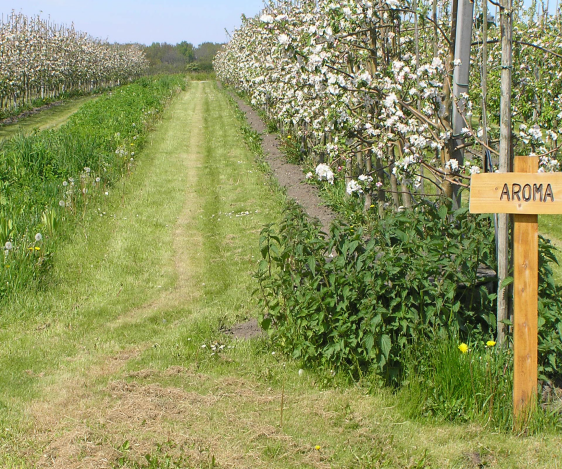
Improving biodiversity by setting up a flower strip in orchards
Understanding flower strips behaviour in European orchards
WHAT:
Organic fruit growers often suffer economic losses due to insect damages. Functional agrobiodiversity (FAB) can reduce pest damage and pesticide use in organic apple orchards. There are many techniques available to improve FAB, and farmers have various preferences and feedbacks throughout Europe. One exemplary measure is the use of flower strips, an easy, attractive, fast technique to improve functional biodiversity in cropping systems by maintaining beneficial insects in the crop. However, choices to select useful botanical species and manage strips require technical knowledge.WHERE:
EU RegionWHO & HOW:
The EcoOrchard project (2014-2018) has been launched to improve our understanding of flower strips behaviour in European orchards, and their effect on apple pests (codling moth, rosy apple aphid). Partners of the EcoOrchard project performed different tasks to improve farmers' commitment:- EU survey to track innovation on agroecological infrastructures set up by apple growers in EU countries;
- Assessment botanical and entomological of flower strips to improve their composition and advice to manage strips after sowing;
- Practical handbook to help farmers with simplified tools to assess themselves their own functional biodiversity and better decide on pesticide need.
MORE INFO
François Warlop, EBIO-Network, EcoOrchard Project
Email: francois.warlop@grab.fr, Tel: +33 4 90 84 01 70
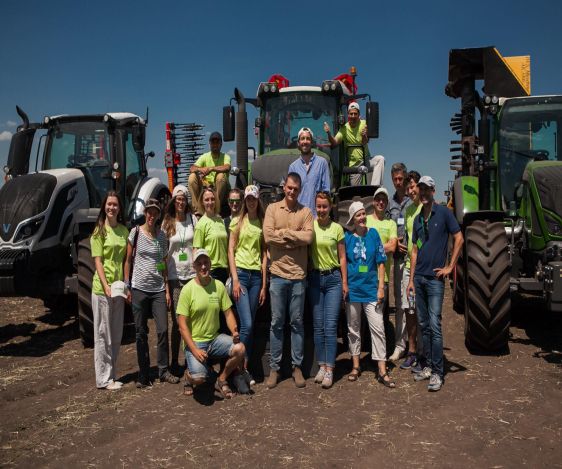
Capacity development strategy to promote organic sector development in Ukraine
The experience with the Leader Approach
WHAT:
Ukraine’s endowments of land resources and other production factors are internationally recognised as providing favourable conditions for arable crop production and wild collection. The goal of the Swiss-Ukrainian project "Organic Market Development in Ukraine 2012 - 2018" is to foster the growth of small and medium enterprises in the Ukrainian organic food sector by developing organic and regional food supply chains. The focus is on both national and international markets and the approach is demand driven. The project aims to strengthen the competitiveness of the country’s organic sector.WHERE:
UkraineWHO & HOW:
The project "Organic Market Development in Ukraine 2012 - 2018" aimed to strengthen the competitiveness of the country’s organic sector by:- increasing the quality and volume of selected organic arable crops and dairy products from small and medium-sized farms;
- improving commercial organic services;
- fostering a conducive environment for the further development of the organic sector.
On 30 July 2018, the organic law of Ukraine, which is harmonized with the European Union organic legislation, has been signed. The project has made essential contributions to elaborating this legislation by providing technical expertise to the Ministry of Agrarian Policy and Food of Ukraine and other Ukrainian organic stakeholders that were actively involved in the development of the legislation.
MORE INFO
Tobias Eisenring, Project presentation
Email: tobias.eisenring@fibl.org, Tel: +41 6 28 65 04 20
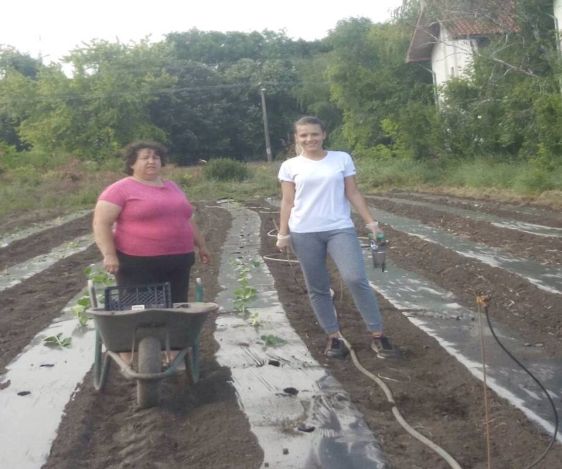
Organic internship programme
WHAT:
Offering an organic internship to young professionals from rural parts of Serbia. Through this internship they gain a better insight into organic farming and the existing possibilities of starting their own farms.WHERE:
SerbiaWHO & HOW:
In Serbia, university students often have a poor practical knowledge when they graduate from their studies in organic production. As there is no specialized entity for labour markets in organic production, organic farms lack specialised labour. Organic Serbia started this three-month practical internship programme to strengthen the capacities of organic young agronomists and food technologists. It also connects them with potential employers. Students have various backgrounds: horticulture, fruit production, viticulture, plant protection, plant-based food technologists, etc. Employers also came from various areas of production, from small farms to large companies and processors.The programme is funded by the GIZ Youth Employment Promotion project and helps to develop a data base of agricultural and food technology engineers in search for a job.
MORE INFO
Olga Keselj, Serbia Organica
Email: olga.keselj@serbiaorganica.org

SUPPORTING CONVERSION FROM TRADITIONAL TO ORGANIC AGRICULTURE BY RURAL DEVELOPMENT PAYMENTS
Measure 11.1.01 Payments in order to adopt practices and methods of organic production
WHAT:
Rural Development Programme Measure 11.1.01 provides financial support for farmers to convert to organic farming. It aims at increasing the number of organic producers and enlarge the agricultural surface cultivated with environmental sustainable methods and techniques. It does this by providing an annual payment per hectare based on higher costs and lower revenue, differentiating by crops.WHERE:
Lombardy region, ItalyWHO & HOW:
This measure provides a financial support for the conversion to organic farming, which is amongst the highest in Italy. It aims at increasing the amount of organic producers and enlarge the agricultural surface cultivated with environmental sustainable methods and techniques. The support consists of an annual payment, calculated per hectare of surface area (on the basis of higher costs and lower revenues, linked to the commitments assumed) worked with organic production methods. Subsidy amounts have been diversified according to the crops, in order to consider the different production techniques and the impact of the proposed commitments:- Arable crops: €375/ha during conversion (2 years).
- Vegetable crops: €600/ha during conversion (3 years).
- Tree crops: €900/ha during conversion (3 years).
- Permanent grassland: €125/ha during conversion (3 years).
- Feed crops for livestock farm: €600/ha during conversion (2 years).
- restoring, preserving and enhancing biodiversity, including in Natura 2000 areas, and in areas facing natural or other specific constraints, and high nature value farming, as well as the state on European landscape;
- improving water management, including fertiliser and pesticide management;
- preventing soil erosion and improving soil management;
- promoting resource efficiency and supporting the shift towards a low carbon and climate resilient economy in agriculture, food and forestry sectors;
- reducing greenhouse gas and ammonia emissions from agriculture;
- fostering carbon conservation and sequestration in agriculture and forestry;
- Measure 11.1.01 Payments in order to adopt practices and methods of organic production
- Measure 11.2.01 Payments in order to maintain practices and methods of organic production
MORE INFO
Ludovico Monforte, Unioncamere Lombardia
Email: ludovico.monforte@lom.camcom.it
This best practice is part of the SME ORGANICS project.

SUPPORTING TO THE MAINTENANCE OF ORGANIC PRODUCTION BY RURAL DEVELOPMENT PAYMENTS
Measure 11.2.01 Payments in order to maintain practices and methods of organic production
WHAT:
To strengthen the organic sector, support to organic producers who are already practicing sustainable techniques is provided as an annual payment. This payment rewards farmers who use farming techniques that restore and enhance ecosystems. Payments are calculated per hectare of surface area, based on increased cost and lower revenues, and linked to environmental commitments. Differences between crops and production techniques are considered in these calculations.WHERE:
Lombardy region, ItalyWHO & HOW:
This measure provides a financial support for the maintenance of organic farming to strengthen the organic sector by supporting producers who have already adopted sustainable methods and techniques. It is also functional to the restoration and enhancement of ecosystems, where the presence of intensive and specialized agriculture has compromised the conditions of agricultural and natural biodiversity, determining both over-exploitation of the soil and the contamination of natural resources such as water and soil, due to an uncontrolled use of synthetic chemical inputs. The support of measure 11.2 consists in an annual payment per hectare as provided by measure 11.1 but in this case the financial support is provided to maintain the organic methods of production, based on higher costs and lower revenues, differentiating by crops in order to consider the relevance of commitment (4):- Arable crops: €345/ha for maintenance.
- Vegetable crops: €540/ha for maintenance.
- Tree crops: €810/ha for maintenance.
- Permanent grassland: €110/ha for maintenance.
- Feed crops for livestock farm: €540/ha for maintenance
- Measure 11.1.01 Payments in order to adopt practices and methods of organic production
- Measure 11.2.01 Payments in order to maintain practices and methods of organic production
MORE INFO
Ludovico Monforte, Unioncamere Lombardia
Email: ludovico.monforte@lom.camcom.it
This best practice is part of the SME ORGANICS project.
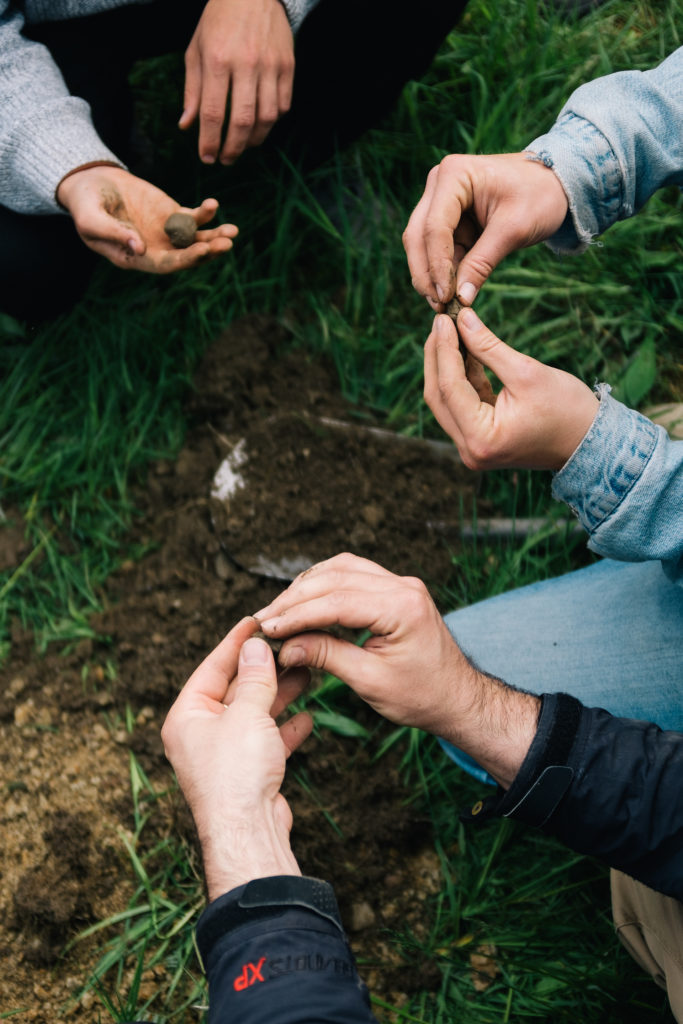
INTEGRATING EDUCATION AND RESEARCH IN AN PRGANIC DEMONSTRATION FARM
Uniting Research & Education with arable farming and livestock production
WHAT:
EKOFARMA PROBIO is an organic demonstration farm where research and education became integral to the activities as well. The farm hosts other organisations’ farm trials and demo events as a hub for organics.WHERE:
Czech RepublicWHO & HOW:
In 2007, PROBIO, the first and biggest organic food processor in the Czech Republic, set up EKOFARMA PROBIO to secure raw materials for their organic food production, in order to become at least partially self-sufficient and to ensure circular use of resources. EKOFARMA PROBIO is 355-ha, fully organic arable farm, with a pig feed lot with an annual production of 400-500 pigs. They use cover crops extensively, usually with mixtures including mustard, peas, flax, lupins, oats, camelina, buckwheat, oilseed radish, mallow, vetch, rye, setaria, sorghum, and various clover species. The farm selects crops that respond well to the landscape with erosion hazards and practices in line with their climate change mitigation efforts: contour sowing, direct drilling for the summer crops, intercropping with clover, intensive use of cover crops (also to provide green manure), and planting orchards of old fruit tree varieties as windbreaks. As a lighthouse farm, EKOFARMA PROBIO is actively engaged in networking and organic hub-building through its research and demonstration activities. Its strong network provides the farm with insight into the organic sector that allows them to actively engage in advocacy work to represent the needs of small and diverse community. MORE INFO Visit their website or find them on Facebook. E-Mail: ekofarma@probio.cz Photo Credit: Martin Matěj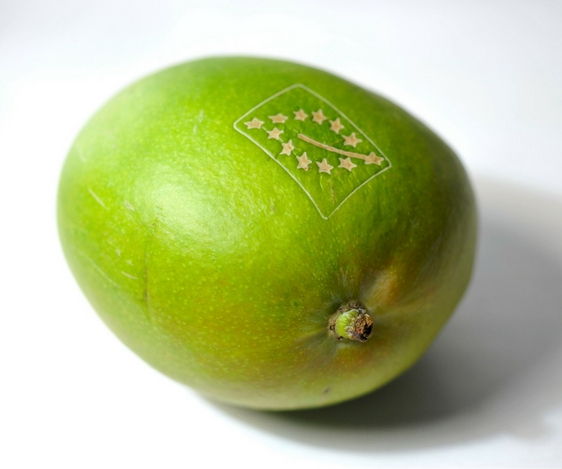
NATURAL BRANDING: ELIMINATING PLASTIC PACKAGING FROM FRESH FRUIT AND VEGETABLES
MAKING PACKAGING MORE SUSTAINABLE
WHAT:
Many consumers who buy organic fruits and vegetables in European supermarkets are frustrated by the fact that these wonderful, sustainably farmed products are often packed in environmentally unfriendly plastic. Through Natural Branding, whereby some of the pigments from the outer layer of the peel of the fruit are removed, we can ensure the organic product can be identified at the check-out counter making it unnecessary to pack in plastic.WHERE:
The NetherlandsWHO & HOW:
In supermarkets, organic fruits and vegetables are usually packed in environmentally unfriendly plastic foil to distinguish them from the non-organic alternative. This is important for supermarkets because they want to ensure that there is no misunderstanding at the checkout counter as to whether someone is buying an organic or non-organic product.Through Natural Branding we are addressing this issue and offering a sustainable solution.
What happens is that a high definition laser removes part of the pigment from the outer layer of the peel of the fruit or vegetable leaving a permanent mark. As this mark is clearly visible it is no longer necessary to pack the products in harmful plastic foil.
Natural Branding is a contact-free method that has been approved by EU Organic certifier SKAL. The method is completely safe and no additional substances are used. Furthermore, the method is so superficial that it has no effect on taste, quality or shelf life. The energy needed for a marking is less than 1% of the energy needed for a sticker.
Through Natural Branding Eosta is saving tons of plastic. Just for one product line for one customer, we are saving over 750,000 packaging units which is enough foil to go around the world twice! Similarly, measured in CO2, it is equivalent to an average car driving 1.3 times around the world.
MORE INFO
Natural Branding Eosta, Watch the video

A WAY TO SUPPORT, REWARD AND PROMOTE LOCAL AUTHORITIES WHO BET ON BIO: “TERRITOIRE BIO ENGAGÉ LABEL”
First organic label for local authorities in France
WHAT:
The Grenelle Environment Forum sets targets on a national level to develop the organic production and sales. It covers 6% of all cultivated area in organic agriculture and 20% of organic products in public catering. To support, reward and promote local authorities that reach those goals, INTERBIO Nouvelle-Aquitaine created the Territoire Bio Engagé label.WHERE:
Region Nouvelle-Aquitaine, FranceWHO & HOW:
The label is awarded to local authorities on a voluntary basis, as they should fill a form and sign a specific charter mentioning that they reached at least one of the goals. A jury examines the applications, and if they are validated, each local authority signs a convention and an official ceremony is organised, which is communicated widely. A special logo and a communication toolkit help the authorities to promote their actions toward the development of organic food and farming.Local authorities do not always know how to promote the fact that they reach the Grenelle Environment target. This label is free and gives them the opportunity to communicate about it. Moreover, they can ask INTERBIO Nouvelle-Aquitaine to help them to improve the introduction of organic products their public catering services.
Therefore, INTERBIO Nouvelle-Aquitaine receives national and regional funds and three people work on this practice, for a total of 80 days/year all together. A newsletter will be created and sent to all the local authorities that received the label. This will help to develop links between them, and to give them tips to take those targets even further. Different tools will also be created to help the local authorities and canteens to follow the evolution of the organic share on the territory (land area and % in catering), which is the main difficulty for them.
So far, the process is a success and a pride for the Region, as it has been referenced as exemplary measure by the Ministry of Agriculture. Today, 107 local authorities and public catering restaurant have received the ‘Territoire Bio Engagé’ label, representing 10,316 hectares of organic areas and 1,540 organic producers.
MORE INFO
Territoire Bio Engagé label

A REGIONAL OBSERVATORY FOR THE DEVELOPMENT OF THE ORGANIC SECTOR
Monitoring, analysis, management and improvement of Apulian organic sector
WHAT:
The Regional Observatory was set up to to simplify the coordination among the players in the organic sector, including farmers, the Apulia region, certification bodies and consumers. The Observatory has the following objectives: monitoring of the regional organic sector; data management and statistics through the Biobank Open Project; connecting to the National Organic Informatics System and Control System; establishing guidelines for organic production; and providing an information desk.WHERE:
Bari, Apulia region, ItalyWHO & HOW:
The observatory aims to monitor and organize the activities related to organic farming at the regional level. The Apulia region was in difficulty for managing the documentation of around 11,000 farmers, and consequently the administrative activities were delayed. The initiative was born as a necessity to simplify the coordination among the players in the organic sector, including farmers, the Apulia region, certification bodies and consumers.Biobank Open Project is a database on organic operators’ info – it contains the farm profile, surfaces, crops, annual production plan, annual processing plan, adviser contact, control body, etc. Biobank was designed to allow the online management of notifications related to activities in organic sector, the annual production programs, the various communications and documentation related to organic farming. The project reached its objectives by being paperless, furnishing the necessary information to the players in the organic sector in real-time, and for being synchronized with SIB system of the MiPAAF as well as with certification bodies at national level. The platform offers to the farmers the opportunity to display and promote their products, so it plays the role of a virtual “vetrina”. A new experimental system for traceability of the organic agrifood products is on-going in the frame of the project.
The main stakeholders are about 11,000 regional organic operators, the inspectors of Apulia region, 2,000 technicians/consultants of farmers, 16 certification bodies, and the consumers. The main obstacle is the unsettled annual budget dedicated to the management of the Observatory that could be resolved through a new Organic Action Plan.
The Regional Observatory for the Development of Organic Agriculture in Apulia Region was set up in 2007. It is part of a National Organic Action Plan funded by MiPAAF, to develop the Rural Policies of the Apulia region, in collaboration with the Mediterranean Agronomic Institute of Bari (MAIB). It supports the implementation of measure 11 “Organic farming” under the Rural Development Programmes 2014-2020.
MORE INFO
The Regional Observatory for the Development of Organic Agriculture
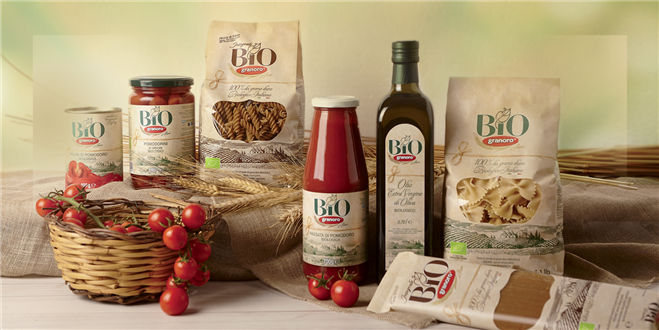
Manufacturing high-quality pasta respecting tradition and improving the sustainability of local agriculture
Granoro – Combining tradition & sustainability
WHAT:
Pastificio Attilio Mastromauro Granoro produces a wide range of pasta and related products. It combines a family tradition of pasta making with high-quality products, experience and innovation. This is visible in both its organic range of pasta as well as in its range of pasta produced with 100% local wheat.WHERE:
Bari, Apulia region, ItalyWHO & HOW:
Pastificio Attilio Mastromauro Granoro – or Granoro – produces a wide range of products (pasta, tomato-based products, EVOO) suitable for adults and children alike, using raw materials grown in accordance with Italian methods of organic agriculture, defined and regulated by the Reg. EC 834/07. Granoro pays attention to environmental issues, to local and traditional production, to the valorisation of typical products, to create job opportunities in the region, and to improve the sustainability of agriculture in the Puglia region.The local traditions and typical production in Apulia are closely related to the land. This is shown by Granoro’s product range. Besides its organic range, Granoro’s produces a pasta with 100% PUGLIA wheat (the Dedicato Range). This initiative is inspired by a desire to enhance the sustainability of agriculture in Apulia and to strengthen the direct links between local farmers and consumers, based on shared values such as respect for the environment, restoring tradition and product authenticity. All of this is done with the entire supply chain – from field to factory – taken into consideration. This initiative was carried out mainly by private investments, and in lesser extent by public funds.
Granoro has chosen to comply, on a voluntary basis, with various international standards concerning both the quality of the pasta and all Granoro’s products and aspects of food safety. Granoro believes that a continuous monitoring system and structured controls involving the whole of its organisation are the best way to pursue the goal of total quality, including health and safety. It has adopted self-control systems to improve its performance about safeguarding the environment and saving energy. Granoro obtained the following certifications: Organic Production Method Certification (ICEA), ISO 14001:2004 Certification, EMAS Certification, IFS Certification, FSSC 22000:2011 Certification, Kosher Certification, Halal Certification, OHSAS 18001:2007 Certification, ISO 22005:2008 Certification, BRC Certification.
Pastificio Attilio Mastromauro Granoro is based in Puglia, a region in the south of Italy known since Roman times as the area where the best durum wheat in Italy and Europe are produced and a traditional production area for pasta made from durum wheat semolina.
MORE INFO
Giandomenico Marcone, Pastificio Attilio Mastromauro Granoro s.r.l.
Tel: +39 080 872 1821

FEEDING VIENNA ORGANICALLY
SUPPORTING ORGANICS THROUGH THE CITY PUBLIC POLICIES
WHAT:
Promotion of organic farming (OF) is part of the environmental policy of City of Vienna. Urban agriculture covers 17% (5,900 hectares) of city area, 25 % being cultivated organically. Largest is the City Farm of Vienna with 1,000 hectares organic arable fields. OF is also fostered by purchasing an obligatory 30% (monetary) of organic food for municipal kitchens. 100,000 meals daily are provided for hospital patients, elderly people, kindergarten children and pupils, with yearly costs for organic quota totalling 15 mio €. The upcoming private urban gardening is supported by an information centre implemented by Bio Forschung Austria.WHERE:
Vienna, AustriaWHO & HOW:
Promotion of organic farming (OF) is firmly embedded in the environmental policy of City of Vienna. Urban agriculture still covers about 5,900 hectares (17%) of city area. Currently, 25 % of the total acreage is cultivated organically by 31 arable, viticulture and horticulture farms. Largest one is the Municipal Farm of Vienna, producing 1,000 ha of organic cereals, potatoes and field vegetables. Since all organic farms in Vienna are run stockless, the 43,000 yearly tons of “biotonne” compost from separately collected organic household garbage are an important source of fertilization.A concept of communal nutrient recycling was developed from 1985 onward by agroecologist Ludwig Maurer and fully implemented by Municipal Dept. of Waste Management city-wide by 1991. Accompanying applied research for compost applicability, environmental safety and quality management has been done by L. Boltzmann Institute of Biological Agriculture (since 2006 Bio Forschung Austria, BFA) which is supported by Municipal Dept. of Forestry and Agriculture. Besides compost, BFA currently researches in soil fertility, green manuring, vineyard ecologisation, preventive plant protection, climate change adaptation and biodiversity management. BFA emphasizes know-how transfer to organic farmers in Vienna and elsewhere, e.g. by “soil practitioner´s courses”. OF in Vienna also has been fostered recently by the “Ecologisation Campaign” of Vienna´s Agricultural Chamber (2015-2017).
Another important incentive for OF is the purchase of organic food for public kitchens, embedded in the sustainable procurement project “ÖkoKauf” (Ecobuy). For hospitals and geriatric centres, retiree´s residential houses, kindergarten and all-day compulsory public schools, an organic-quota of 30% monetary (kindergarten & schools even 50%) is obligatory prescribed in the Viennese Climate Protection Programme (“KliP”) since 1999. Currently, a 100,000 full boards/meals are provided daily. For a total amount of 15,000 t of organic food purchased yearly, 15 mio € are spent. Procuring organic food saves an estimated 11,700 t of CO2-eq/year in Vienna, contributes towards short food supply chains and provides high quality nutrition of both clients and Municipal employees.
The demand for private Urban Gardening (e.g. Self-Harvesting, Neighbourhood Gardens, Community Supported Agriculture) quickly has been increasing lately. For supporting interested citizens, an information centre has been implemented in BFA in 2016, offering also gardening courses and a visitor´s garden.
MORE INFO
Bio Forschung Austria
ÖkoKauf (Ecobuy)
Viennese Climate Protection Programme (“KliP”)
Garteln in Wien (information center)
Photo credit: Matthias Nemmert
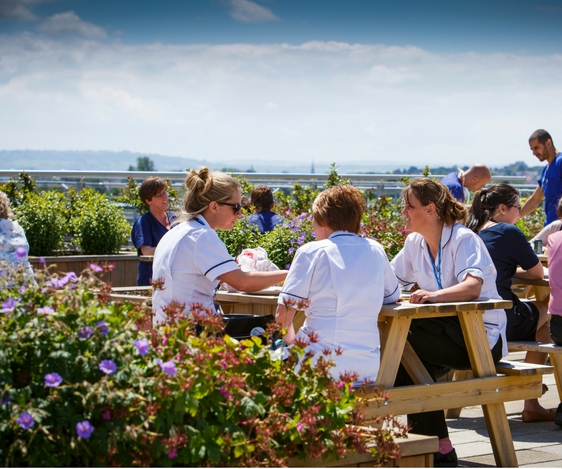
FOOD FOR LIFE: MAKING GOOD FOOD THE EASY CHOICE FOR EVERYONE
PROMOTING SUSTAINABLE DIETS AND HEALTHY FOOD
WHAT:
Food for Life works with public and private sector leaders to make good food the easy choice for everyone, whoever and wherever they are. The programme takes a whole system approach to food, changing both the food environment and food culture within which people make choices. The programme incorporates the Food for Life Served Here scheme, which provides an independent endorsement that food providers are taking steps to improve the food they serve. Food for Life is an evidence-based intervention that impacts on health and wellbeing, education, sustainability and inequalities across communities.WHERE:
The United KingdomWHO & HOW:
Food for Life works with caterers to put good food on the menu in all the places where people live out their daily lives. The programme engages communities to get people of all ages cooking and growing food again and out onto local farms so they have a positive connection with real food. It works with nurseries, schools, universities, workplaces, hospitals, care homes and visitor attractions. It works in the high street, with local authorities, National Health Service Trusts and with entire cities.The Food for Life approach works at a population level with settings and communities, taking a whole system approach to make it easy, normal and enjoyable to eat well. This includes work care settings, hospitals and in the community to tackle malnutrition and loneliness among older people through good food provision and creating opportunities for communal dining.
The Food for Life Schools programme is the flagship programme, widely commissioned by public health teams and taken up by schools across England. Over 1,100 School Awards have been achieved and over 5,000 schools have enrolled in our national network. Pupils in Food for Life schools are cooking, growing, and visiting farms to learn about where food comes from.
Independent evaluation of the Food for Life Schools programme has shown that pupils in Food for Life schools were twice as likely to eat five or more portions of fruit and vegetables per day than those in comparison schools. Food for Life Catering Mark Gold menus have up to 47% lower climate impact than standard school menus. Investment in Food for Life menus brings a Social Return in Investment of £3 for every £1 spent, mostly in the form of opportunities for local food businesses.
MORE INFO
Food for Life
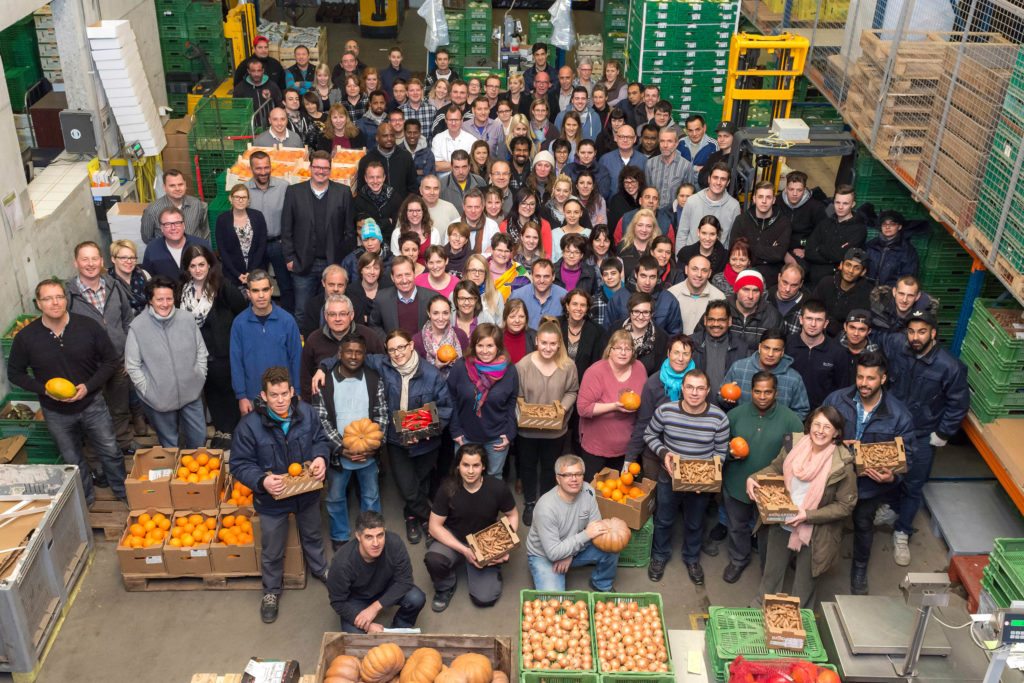
BIOPARTNER – CONTINUOUSLY IMPROVING SUSTAINABILITY & QUALITY MANAGEMENT
Organic wholesaling for Swiss organic shops, retail and gastronomy
WHAT:
Biopartner is the leading organic wholesaler in Switzerland. They supply a broad range of organic products to specialized organic shops, retail, gastronomy as well as the food processing industry.WHERE:
Seon & Neuchâtel, SwitzerlandWHO & HOW:
Bio Partner plays an essential role in the Swiss organic market as it gives organic shops, gastronomy, and the food processing industry the opportunity to buy a wide range of organic products from one supplier. Bio Partner aspires progressive and customer-oriented logistical processes. Sustainability is an important topic, not only at the level of logistics, but in the entire company. Three working groups consisting of employees from all departments work on the definition of new measures to improve the environmental, social and corporate sustainability of the company. Measures to improve environmental sustainability include the certification with ISO 14001 certificate for environmental management, the measurement of environmental indicators, the reduction of CO2 emissions and food waste, the support of organic seed production and breeding, etc.Bio Partner has about 3.000 customers specialised organic retail shops and other retail, food processing industry, gastronomy, and commodity trading. In 2016, Bio Partner delivered to 653 organic shops, 1.450 other retail shops or sales points, 799 customers in gastronomy and 682 customers in the food processing industry. The company has their own storage areas covering about 10.000m2 and the products are distributed by the internal logistical infrastructure.
Bio Partner Switzerland AG is a shareholder company that was founded in 2007 by three companies (Via Verde, Eichberg Bio AG and Vanadis). In 2018, Bio Partner and Somona, formerly being competitors merged in order to join forces and provide better support for independent organic retailers. Bio Partner has 255 employees based at two locations in Switzerland: Seon in canton of Aargau, and Neuchâtel in the French-speaking part of Switzerland. It is the leading wholesaler for organic products in Switzerland, covering a range of about 13.500 products, including fresh foods such as fruits, vegetables, dairy products, vegetarian products, frozen and dried foods, as well as natural cosmetics.
MORE INFO
Bio Partner Schweiz AG

ORGANIC FARMER NETWORK
How farmers can together ensure protein feed self-sufficiency
WHAT:
The organic farmer network connects animal husbandry farms and crop producers. Close cooperation between farms ensures feed self-sufficiency and enhances profitability of crop producers.WHERE:
South Ostrobothnia region, FinlandWHO & HOW:
The aim of the organic farmer network is to ensure animal husbandry farms’ protein feed self-sufficiency by pairing it up with crop producers and starting close cooperation, which benefits both farms. Together, the farms find out the need of protein feeds, cultivation possibilities of different feeds and the suitable annual crop rotation.In an optimal situation, animal husbandry farms can purchase the needed seeds together with crop producers and agree about the harvesting method with the contractor. This close cooperation has are multiple positive effects: the profitability of the crop producers increases and the animal husbandry farms get the needed feed. In addition, the motivation and level of expertise of the farmers on both farms will increase.
The farmer network is a result of cooperation between farmer associations and advisory services. The key to successful cooperation is good and reliable relationship between farmers, which can be developed and deepened in association meetings, with farmer advising and at informative events. Help from active farmer advisors is needed. Farm advisors will introduce farmers to each other and make sure that the farms have a joint cropping plan before starting the cooperation.
The availability of protein feeds is not the only positive side of the farmer network. The network also has a social aspect and enhances farmers’ professional skills. Cooperating farms can learn a lot from each other, and shared success is an important factor in increasing the positive spirit and good sides of the profession.
MORE INFO
Erkki Vihonen, ProAgria Etelä-Pohjanmaa Rural Advisory Services
Email: erkki.vihonen@proagria.fi, Tel:+35 8 40 67 87 689
Photo credit: FARMER NETWORK, PixaBay blende22, free commercial use
This best practice is part of the SME ORGANICS project.

ORGANIC INFORMAL BUSINESS SCHOOL
Physical and on-line private training initiative for local farmers, in view of conversion and maintenance of organic farming
WHAT:
The ‘Organic Informal Business School’ is a private initiative, organized as an itinerant school that operates for free in rural areas and small towns in the North-West Region of Romania. The courses are available on the School’s YouTube channel.WHERE:
North-West region, RomaniaWHO & HOW:
The Organic Informal Business School is a private initiative that started in 2012 that consists of training session that shows local farmers and interested stakeholders the steps to follow for developing an organic business. It does this by increasing their competences to convert and develop their agricultural land and cultures in organic cultures.The trainer specialized in organic farming is Mr. Avram Fitiu, professor at the University of Agricultural Sciences from Cluj-Napoca. He gives the training in partnership with local public authorities, professional associations and schools. The target group / beneficiaries are farmers from the North-West and Central Regions of Romania.
Currently, the Organic Informal Business School is a free, privately funded initiative. The School generates a wide network of interested beneficiaries, which need further assistance in developing the business plan and attract financing. The costs of return are from consultancy, advice in view of certification and from technical advice for agri-issues related to the organic cultures.
So far, the results achieved are:
- over 15,000 farmers informed and prepared for starting an organic business;
- over 150 business ideas generated in organic farming and along the value chain organic such as farm pigs and sheep (short value chain, production, processing and sale), energy crops (with willow acacia, pawlonia), ecological forest (short value chain), integrated sales systems of organic products by association of several farmers, culture of roses in protected areas (greenhouses, solariums) integrated farm, etc.;
- over 500 villages where this initiative was promoted.
MORE INFO
Dr. Avram Fitiu, The Organic Informal Business School
Each organic lesson is presented via YouTube sessions
This best practice is part of the SME ORGANICS project.

IMPROVING THE TRANSFER OF RESEARCH & INNOVATION RESULTS TO FARMERS
Providing training and advisory services
WHAT:
INTIA provides advice and guidance to producers, based on an extensive net of technicians and an own experimentation network. The main goals of INTIA’s service are to improve the transfer of research and innovation results to farmers, to find solutions to their problems or needs and to improve their profitability and sustainability.WHERE:
Navarre region, SpainWHO & HOW:
The Institute for Agri-food Technology and Infrastructure of Navarre (INTIA) aims at transferring knowledge and innovation to improving profitability and sustainability, sustaining a living countryside, and providing to society high-quality foodstuffs. INTIA ensures success and detects the conventional and organic sector’s needs and problems by using its extensive network of 150 technicians distributed over 13 offices. These technicians are in direct contact with farmers and agroindustries on the one hand, and with the research and development sector on the other hand.
To find solutions, INTIA uses different experimental approaches, such as demonstrative trials at fourteen different fields. These experiences generate knowledge that technicians themselves transfer to the agrifood sector, of course complying to rules of confidentiality. Knowledge is transferred on demonstration days, in publications, etc. This knowledge is generated for both the entire sector – more than 8,500 farmers – and partners only.
Initially, organic advisory service was integrated in conventional service teams. Nowadays a multidisciplinary team replies all kind of questions related to organic projects: agricultural yields, fertilizers, animal production, pests, commercialization, profitability, training etc. There is also an advisory service specially aimed at young farmers promoting new agroecological projects.
The advisory services started in 1980s when the Government of Navarra decided to invest in the improvement of the agricultural sector. INTIA itself was founded in 2011 because several public companies with over 30 years of experience in agriculture, irrigation and the food industry merged. The service is financed by public and private funding. This combination has been a key to success, as it assures impartiality of recommendations and the commitment of partners and collaborating companies in the studies carried out.
The Government of Navarre is a key stakeholder, as INTIA is an instrumental company of the Department of Rural Development, Environment and Local Administration of Navarra. INTIA has been designated as official advisory service by the Regional Government in the new Rural Development Programme (RDP) 2014-2020.
MORE INFO
Juan Manuel Intxaurrandieta, INTIA
Email: jintxaur@intiasa.es,Tel:+34 9 48 01 30 40
This best practice is part of the SME ORGANICS project.
EkoMarchaty – organic fruit-growing farm
ProBiotechnology in agriculture
WHAT:
In the past 10 years, the owners of EkoMarchaty have not used chemical fertilizers. Instead they used a solution called ProBiotechnology. In ProBiotechnology, a non-genetically modified composition of beneficial microorganisms is used. Their metabolites contain a total of fermented mixture of natural ingredients.WHERE:
Lodzkie region, PolandWHO & HOW:
The owners of EkoMarchaty are convinced that ProBiotechnology enhances the efficiency and bioprotection in agriculture, revitalization and protection of the environment, as well as in the household and human health. The use of these beneficial microorganisms increases the efficiency of farms using these solutions and assists them in maintaining the highest standards to produce organic food.
The organic fruit-growing farm is located on an area of 19 ha, mostly in the beautiful scenery of Marchaty village on the south outskirts of Biala Rawska. The territory is dominated by scattered farms, neighbouring forests, fields and streamlets. The lack of intensive fruit-farming due to low soil classes favours organic farming. The other part of the farm EkoMarchaty is located in the village Zurawia, on the west side of Biala Rawska neighbouring Bialski forests.
Currently the entire family owns the machinery and storage facilities. On the farm, they grow the following products: apple trees (12 ha), cherry trees (1,5 ha), plum trees (1 ha), fields (1 ha), forests (3 ha). The investments in the farm are supported by the European Rural Development Program.
MORE INFO
Arek Kartus
Email: arek.kartus@interia.pl , Tel: +48 666-941-141
WIATROWY SAD – INCREASING THE QUALITY AND LONGEVITY OF ORGANIC JUICES
Using processing modernisation to improve end-products
WHAT:
The family business ‘Wiatrowy Sad’ is a company producing juice from their own farm. Thanks to funding from the Rural Development Programme it was able to invest in farm modernisation and press machinery. The end-product of the new press-method is a high-quality bag-in-box packaged juice that stays fresh for up to 14 days after opening without fermenting.WHERE:
Lodzkie region, PolandWHO & HOW:
When they started the press company, the farm owners encountered huge difficulties in receiving adequate funding for the investments they wanted to make. The press method of juice production was a novelty at the time, and no one really believed that consumers would be willing to pay extra money for juices of a better quality.New to the trade, the owners did not have enough clarity of what kind of machinery would be the most suitable for the production, as they still had to gain experience in choosing the best varieties of fruits and vegetables for pressing.
When the company succeeded in receiving the funding from Rural Development Program, it was able to modernise the farm and the processing materials (press machinery). Thank to these investments, the bag-in-box packaging juices stay fresh up to 14 days after opening (without refrigerating). Special packaging and a valve allow the juice to be poured multiple times without fermenting.
‘Wiatrowy Sad’ is a family company that produces juices from its own beautiful fruit-growing farm, situated near the Łódź Hills Landscape Park in the Mroga river valley – municipality Dmosin. Juices are produced from whole, natural fruits without preservatives or water, but are rich in natural sugar. Juices are naturally cloudy, they have rich flavours and preserved characteristics of raw fruit and vegetables, what is very beneficial for health.
MORE INFO
Wiatrowy Sad
INVESTMENTS IN AGRICULTURAL FARMS OTHER THAN IRRIGATION
Improving the viability of farms and promoting innovative agricultural technologies
WHAT:
Spanish farms often face issues related to droughts. Rural development funds are often given to farmers to invest in their farms. However, these funds often focus on irrigation, moving the problem from one region to another. Funds from the Rural Development Programme are used to give grants to farmers to improve the long-term viability of their farms by other means than irrigation, and to promote innovative agricultural technologies.WHERE:
Navarra region, SpainWHO & HOW:
To be eligible to receive these funds, the farm’s agricultural activity should be related to the production of agricultural, livestock and forestry products, but can also include first processing or direct sales by farmers. The activities carried out in agricultural holdings which are necessary for preparing an animal or plant product for the first sale are excluded from aid to investment in agroindustries.The aid should improve the overall performance of the farm and will be provided as a direct capital subsidy. This measure consists of grants for farmers to invest in their agricultural holdings with the objectives to improve the overall performance of the farms and promote their sustainability. They fall under the measure "Investments in agricultural holdings" (M04.01) of Rural Development Programme of Navarra 2014-2020.
MORE INFO
Joaquín Resano, Director of the Unit of Promotion of Organic Food and Farming and Cross-Cutting Actions in the Agrarian Sector of the Government of Navarra
Email: joaquin.resano.egea@navarra.es
This best practice is part of the SME ORGANICS project.
Do you have an initiative that makes food & farming systems across Europe fair, environmentally conscious, healthy & caring?
Click here to submit your own initiative!